
Breadcrumb

Office of Health Promotion
We Support Your Wellbeing
As a part of Campus Community Health at UCM, the Office of Health Promotion helps you learn, grow, and thrive through education about, and engagement in, health-promoting and risk-reducing behaviors.
Using sound data and best practices such as the Strategic Prevention Framework, the Social-Ecological Model, and the Spectrum of Prevention, we work to put the power of prevention in your hands.
Our Services

Online Health Promotion Courses for New Students
New to UCM? To promote a healthy campus community and support student success, UCM requires new students to complete online health promotion courses. These courses are free and confidential.
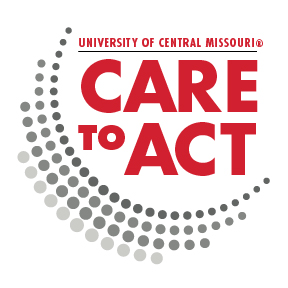
Care To Act
Interpersonal violence, substance misuse, bias and discrimination, and mental well-being/suicidality are concerns that affect the well-being and safety of everyone.
UCM's Care To Act approach is about each of us being prepared to make a positive difference on our campus and to act on our sense of caring for each other. Through a brief online overview, facilitated, in-person group conversations, and purposeful connection with existing programs and services, the Care To Act approach focuses on how each of us can be engaged community members, working together to support a culture of care on our campus.
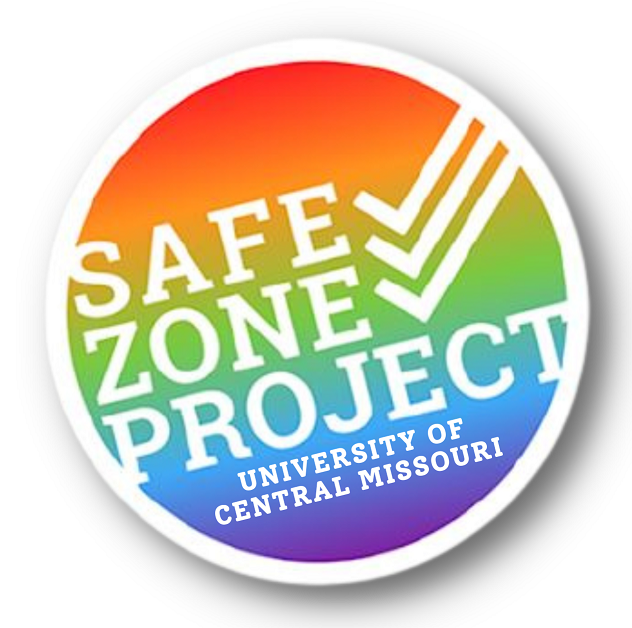
Safe Zone
Safe Zone workshops at UCM offer information on LGBTQIA+ identities, terminology, ally development, and ways to support LGBTQIA+ students on our campus.
We invite anyone in the UCM community to attend a Safe Zone workshop and become a Safe Zone ally, including staff, faculty, and students!

Compliance
The Office of Health Promotion supports UCM's compliance with state and federal law, including:
- Assignment of sexual violence prevention and suicide prevention courses to new students
- Coordination of the Alcohol and Other Drugs Annual Notification for all employees and students
- Completion of the Biennial Review of all alcohol and other drug policies and programs

Presentations for Classrooms, Student Orgs, and More
Our office provides fun and interactive educational presentations to help UCM students make informed health-related decisions.

Warrensburg Area Resources for Students (and others)
A list of resources for help with food, clothing shelter, social services, and more.
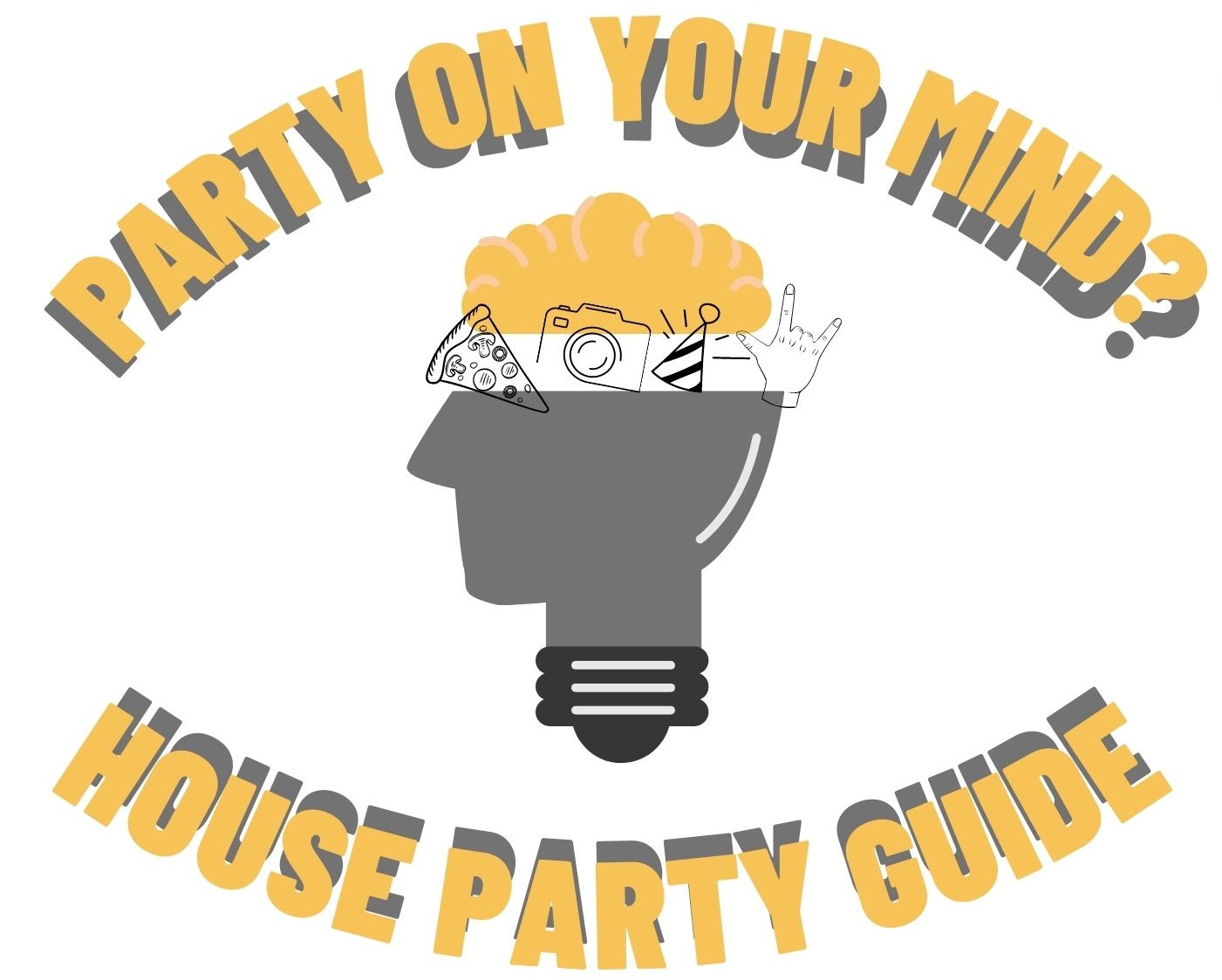
House Party Guide
Planning a party at your place? Read over this house party guide for tips on how to keep it safe, protect your stuff, and have fun.
Our Approach

The Strategic Prevention Framework
Research and experience have shown that prevention must begin with an understanding of complex problems within complex environments. The Substance Abuse and Mental Health Services Administration developed the Strategic Prevention Framework to help communities (including college and university campuses) more effectively address substance use disorders and mental health concerns.

The Social Ecological Model
Useful in many types of individual and community engagement work, this model considers the complex interplay between individual, interpersonal, organization, community, and policy factors that impact attitudes and behaviors, helping to clarify the range of both risk factors and protective factors that may be involved. The overlapping rings in the model illustrate how factors at one level influence factors at another level.
The model also suggests that in order to prevent harm - which is at the heart of our work - it's necessary to act across multiple levels of the model at the same time. This approach is more likely to sustain prevention efforts over time and achieve positive population-level impact.
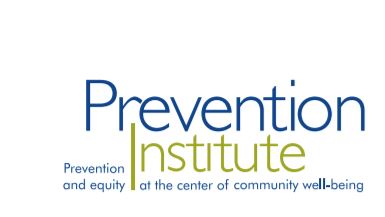
The Spectrum of Prevention
Closely aligned with the Social Ecological Model, this tool describes a range of activities specific to effective prevention. Used nationally in prevention initiatives, including violence prevention and injury prevention, it provides a framework for a more comprehensive understanding of prevention, including six levels for strategy development.
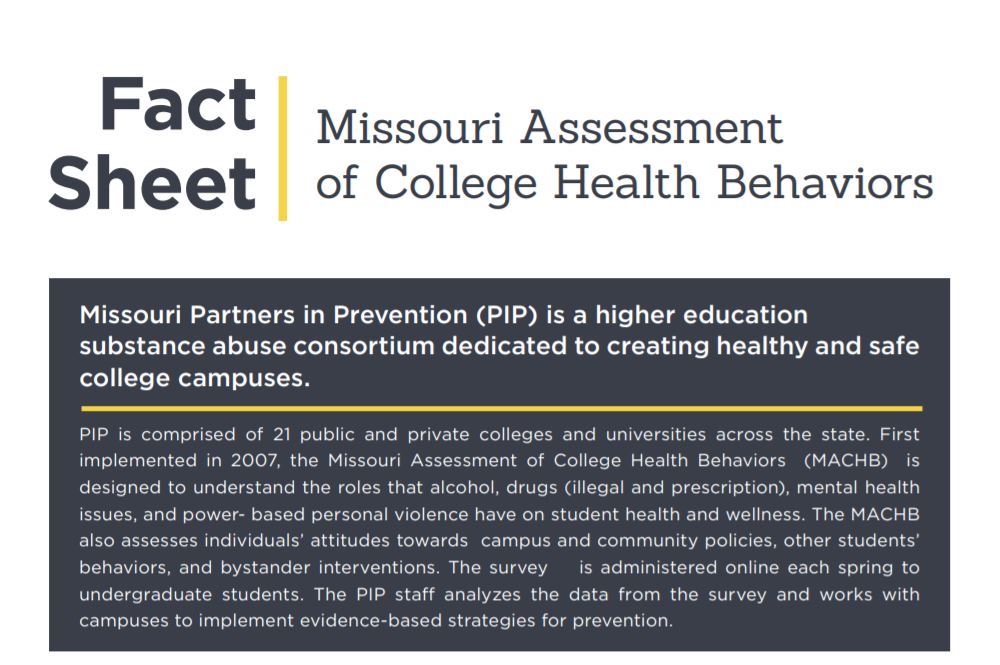
Data Collection
The Missouri Assessment of College Health Behaviors (MACHB) is an annual survey sent to thousands of Missouri college students every year, including UCM students.
This survey asks a wide variety of questions about students' attitudes and behaviors regarding alcohol, cannabis and other drugs, mental health, interpersonal violence, and more.
Administered by Missouri Partners in Prevention, the MACHB is a rigorously vetted, multi-year survey and provides us with rich, reliable data that helps inform and guide our work in prevention and wellness at UCM.
Read this fact sheet for more information about the MACHB, and contact the Office of Health Promotion at healthpromotion@ucmo.edu or 660-543-8947 for information about UCM's results.
Our Campus-wide and Community Work
UCM Partners in Prevention Coalition
Composed of leaders from across campus, the Coalition meets 10-12 times per year.
Purpose
- To promote an environment that supports UCM students in making safer and lower-risk choices regarding alcohol and other drugs, interpersonal relationships, and mental health, each of which have a significant impact on the recruitment, retention, and graduation rates of our students.
- To review, evaluate and enhance health promotion and harm reduction efforts across the UCM campus through best-practice, data-supported prevention approaches.
Biennial Review
The 1989 amendments to the Drug-Free Schools and Communities Act (DFSCA), as articulated in the Education Department General Administrative Regulations (EDGAR) Part 86 (the Safe and Drug-Free Schools and Campuses Regulations) require that all institutes of higher education closely examine their prevention program on a biennial basis.
The current biennial review documenting UCM’s prevention efforts related to alcohol and other drug use is available by sending a request to healthpromotion@ucmo.edu.
Campus Alcohol Board
UCM's Campus Alcohol Board (CAB) is a multi-disciplinary subcommittee of the UCM Partners in Prevention Coalition, appointed by the president, comprised of various members of the university community, and coordinated by Campus Community Health. The CAB meets as required or called upon to advise the president and university community on issues related to alcohol education programs, policy implementation and enforcement, community relations, and other topics as may arise related to the university’s alcohol policy and programs.
To obtain more information or clarification regarding the development of procedures governing the sale, service, possession or consumption of alcohol in and on university facilities and grounds, please contact Amy Kiger, Director of Campus Community Health, at kiger@ucmo.edu.
Statewide Partnerships and Coalitions
- Missouri Partners in Prevention (PIP) is Missouri's higher education substance misuse consortium dedicated to creating healthy and safe college campuses through evaluation, funding, training, technical assistance, and coalition building expertise. Their services further our efforts to create a campus environment that supports responsible decisions regarding alcohol and other drugs. In addition, PIP also provides services to prevent suicide on campus and positive mental health among college students.
- The Missouri Coalition Against Domestic and Sexual Violence unites Missourians with a shared value that rape and abuse must end, and advances this through education, alliance, research and public policy.
Internships and Employment
If you're passionate about the issues we address and are interested in an internship in the Office of Health Promotion, please contact us at 660-543-8947. Additionally, we typically employ students in our Program Assistant positions, so be sure to check jobs.ucmo.edu to see if we're currently hiring.
Other UCM Resources
- UCM Alcohol Policy
- UCM Illegal and Controlled Drugs Policy
- UCM Tobacco Policy
- Tobacco Free Campus information
- University Health Center
- UCM Counseling Center (staffed by professional clinicians)
- Central Missouri Clinic (staffed by 2nd year graduate students)
- Michael Hough Counseling Center (staffed by 2nd year graduate students)
Contact
Office of Health Promotion








